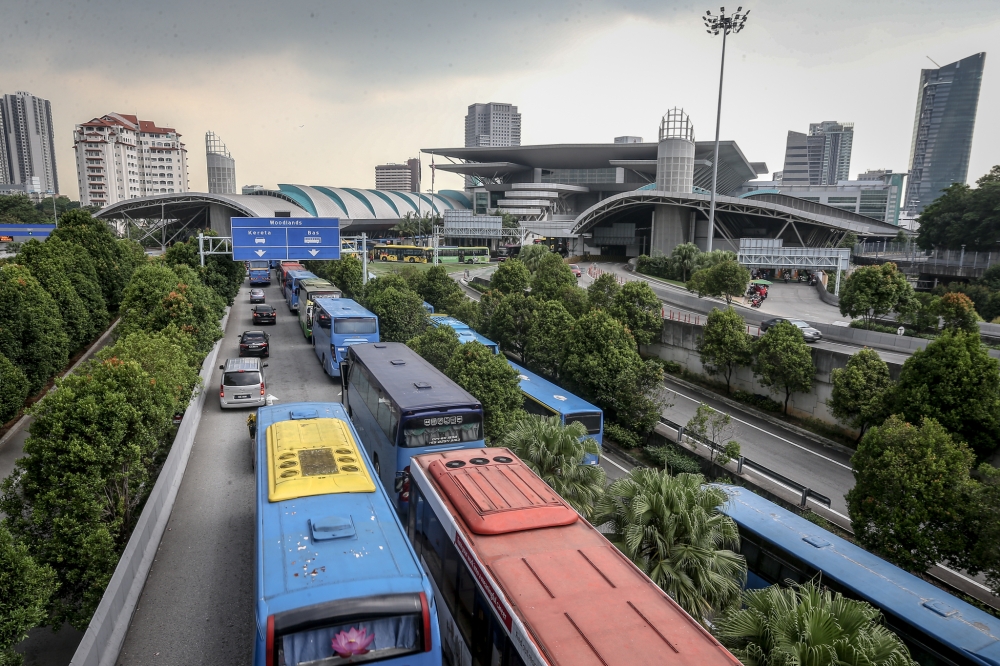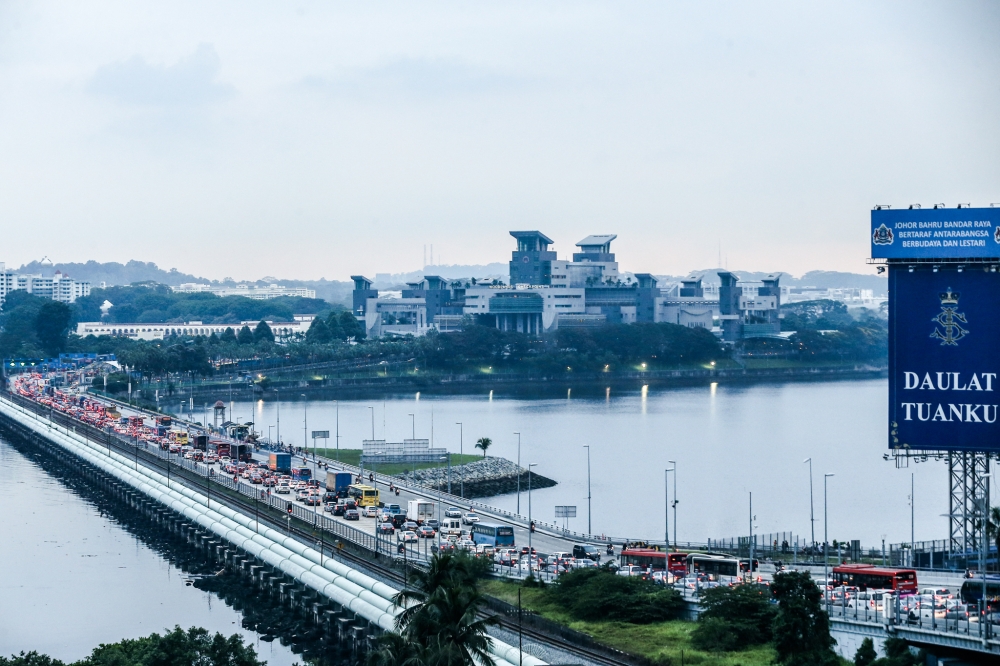JOHOR BARU, June 12 — Johor’s relationship with Singapore holds undeniable relevance, and not just because the prosperous city-state is just a stone’s throw away from the state capital of Johor Baru.
For decades, the city-state represents a market of about 5.5 million people, with its geographical proximity and shared history with Johor.
However, Johor has always fallen short in comparison with Singapore. Being a highly-developed nation, Singapore prides itself as one of the world’s most business-friendly regulatory environments for local entrepreneurs and is ranked among the world’s most competitive economies.
For more than 40 years, Singapore also provides a competitive and well-paying job market for hundreds of thousands of Malaysians that travel to and back from Johor Baru on a daily basis.
For Johorean Halil Ismail, the recent talk of setting up a Johor-Singapore economic region to strengthen the state’s economic potential is a long-awaited initiative.
The 45-year-old technical supervisor, who works in Singapore, said that the proposal for it should have started about 15 to 20 years ago when the island republic was already an established developed nation.
“While the bonds of the cross-border economy have always existed and show promising opportunities for growth, there was no proper platform that took advantage of Johor’s unique relationship with Singapore.
“Most businesses in Johor Baru have always catered to Singaporeans, and in a way, both our economies have prospered through this long-standing arrangement.
“Unfortunately, there have been no proper government-driven initiatives to encourage this unique relationship that can spur further and continued economic progress made possible by our close ties with Singapore,” said Halil when met by Malay Mail in the city here recently.
He was responding to Putrajaya’s plan to establish a Johor-Singapore economic region as a means to strengthen the southern state’s economic potential.
On May 28, Economy Minister Rafizi Ramli said that the idea has been mooted by the state government, the federal government and the government of Singapore in meetings between the three parties, but it has yet to be raised as an official proposal.
He said the government is prepared to see in what way Singapore views Johor as part of the economic zone and vice versa.
Both Johor and Singapore share two land border crossings — the Johor Causeway in the city here and the Second Link crossing in Gelang Patah. It is considered the most frequently crossed border in the world with more than 300,000 on both crossings per day related to work, business transactions, family reunions, tourism, or simply shopping.
Due to the proximity and shared languages, what happens in Johor will usually matter on the other side of the border.

Johor is also considered the top destination for Singaporeans. Come the weekends, many will drive to Johor for a weekend or day trip. Places like Iskandar Puteri and even further north in Kulai are among the favourite destinations for Singaporeans.
On the other side of the border, more than 300,000 Malaysians enter Singapore daily from Johor and back for work. Regardless of their status as workers, they contribute on a daily basis with their work and talent to Singapore.
Halil also pointed out that any bilateral committee formed must consider the opportunities related to various areas such as the job market, export and imports, goods movement and foreign direct investment (FDI).
For it to work, he said both sides need to see the benefits of any implementation.
“Currently the various areas mentioned already exist, but it’s not jointly regulated or managed,” he said.
Johor-based businessman KK Ng said he welcomes the government’s initiative for a Johor-Singapore economic region but would like to see a commitment from both sides.
Like Halil, the 49-year-old Johorean understands the unique relationship that Johor and Singapore have.
“However, I have only noticed a one-way initiative to growing South Johor’s economy with Singapore from the various programmes under the state and federal initiatives such as the Iskandar Malaysia Regional Development Authority (Irda) and also the state’s government’s Johor Economic, Tourism and Cultural Office (Jetco).
“It would be good to see what Singapore can offer as well and I believe the proposed Johor-Singapore economic region will be a focused joint effort similar to a shared economic and trade committee,” he said.
Irda is a federal government statutory body tasked with the objective of regulating and driving various stakeholders in both the public and private sectors towards realising the vision of developing Iskandar Malaysia, which is South Johor, into an international metropolis.

Jetco is a state agency staffed by the Johor Civil Service to attract investments as well as to promote tourism and culture in Singapore. Its objective is to pave the way for direct investments between Johor and Singapore.
Ng said that its good that the proposal will look into tapping the advantages offered by both countries, but it must also address the current inefficiencies in the system as many Singaporeans are keen to also go into business or invest in Johor.
At present, he said businesses in Johor have noticed an increase in Singaporean customers following the slowing trade, elevated inflation rates and currency strengthening since early this year.
“Usually in such a scenario, more Singaporeans would cross over for cheaper goods and services, and this would ultimately benefit Johor’s retail, hospitality and also tourism sectors.
“For seasoned Johorean business owners, especially in the city centre, such a scenario has been around for years and is nothing new,” he said, adding that Singaporeans are averse to low-priced goods and savings which Johor offers to their benefit.
However, Johor Baru business owner CK Muhamad Asif questioned the planned establishment of the Johor-Singapore economic region at a time when the Malaysian economy is not doing well.
The 29-year-old convenience store operator said it would be better that the government boosts the domestic economy first before setting up the Johor-Singapore economic region.
“I believe that both Johor and Singapore can gain with this cooperation. However, it would be better that our domestic economy stabilizes first as to gain better leverage,” he said.
Muhamad Asif noted that the proposal between Singapore and Johor needs to start on a mutual path and not for only one party to gain the upper hand.
For Johor South small and medium-sized enterprise (SME) adviser Teh Kee Sin, the proposal for a Johor-Singapore economic region looks sound and interesting.
“Looking at the (appreciating) Singapore dollar, with more than 300,000 Malaysians traveling in and out daily, the Johor-Singapore economic region plan sounds like a good start to explore.
“This is also in addition to about a million Malaysians living and working in Singapore,” said Teh when contacted by Malay Mail.
However, like any experienced businessman, Teh pointed out several issues on the proposal such as the need for the proposal to be government-to-government (G2G) driven.
He said both the Malaysia and Singapore governments need to discuss and lead off with the proposal.
“We have to bear in mind that Singapore is a vibrant city-state and can attract investors on its own as these business savvy people have trust in the Singapore government,” he said on the island republic’s good reputation among investors.
Personally, Teh doubts that there will be any Singapore investors, businesses or SME’s keen to join in the Johor-Singapore economic region without the G2G involvement.
“For them, any form of investment needs to be realistic and they will tend to look at their returns on investments (ROI) as an indicator.
“So, end of the day a strong G2G effort is needed for the proposal to start off, on good footing,” he said.
Teh also brought up the issue of South Johor’s once ambitious Iskandar Malaysia project which is related to the proposed economic zone but is a wholly federal and state government initiative.
“Iskandar Malaysia started in 2007 and it has been more than 15 years since it has been around. However, to date, its development has been slow.
“Under the proposal, both the Malaysian and Singapore governments can consider making use of Iskandar Malaysia to encourage and attract mid-range technology companies to come over and invest,” he said.
Teh said the government can also offer various land concessions to these technology companies or other industries under a G2G overwatch.
He said both sides may benefit as Singapore has a limited as well as higher land cost and Malaysians are keen to pick-up on the knowledge provided a percentage are hired by them under the initiative.
“Such a strategy may work as we should look into the existing Iskandar Malaysia zone and make full use of it to realise its potential,” he said, adding that such a proposal needs a timeline for the Johor-Singapore economic zone to succeed.






















